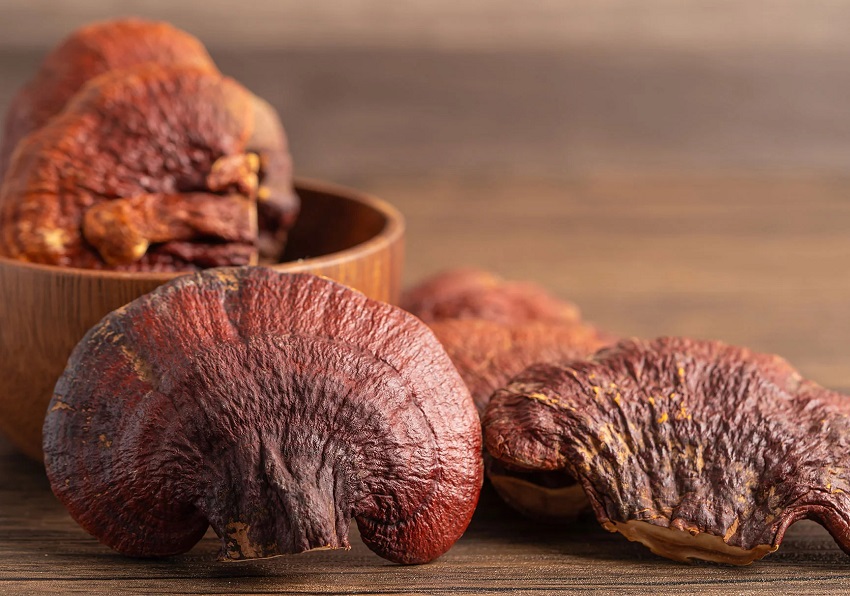
13 Jul Is Reishi Good for Sleep?
Imagine lying in bed, tossing and turning, unable to find a peaceful slumber. It’s a frustrating experience that many of us have faced at some point in our lives. The search for natural remedies to improve sleep quality has led to the discovery of various herbs and supplements. One such natural sleep aid gaining popularity is Reishi. In this article, we will explore whether Reishi is good for sleep and how it may contribute to better restful nights. This article is presented by https://depressiontrouble.com/
Understanding Reishi
Reishi, scientifically known as Ganoderma lucidum, is a type of mushroom that has been used in traditional Chinese medicine for centuries. Reishi mushroom is often referred to as the “mushroom of immortality” due to its potential health benefits. Reishi mushrooms are known for their unique blend of bioactive compounds, including triterpenoids, polysaccharides, and peptidoglycans, which are believed to contribute to its therapeutic properties.
The Link Between Reishi and Sleep
- Reishi and Stress Reduction
Stress and anxiety are common culprits behind sleep disturbances. Reishi mushrooms are known for their adaptogenic properties, which means they can help the body adapt to stressors and promote a sense of calmness. By reducing stress levels, Reishi may indirectly improve sleep quality. - Supporting Relaxation and Sleep Onset
One of the potential ways Reishi may contribute to better sleep is by supporting relaxation and sleep onset. Some studies suggest that Reishi extracts may have a calming effect on the central nervous system, promoting relaxation and making it easier to fall asleep. - Enhancing Sleep Duration and Quality
Reishi mushrooms contain compounds that may positively influence sleep duration and quality. Certain triterpenoids found in Reishi have been shown to have sedative properties and promote deep sleep. By enhancing the overall quality of sleep, Reishi may help individuals wake up feeling more refreshed and rejuvenated. - Boosting Immune Function
Sleep and the immune system are closely intertwined. Poor sleep can weaken the immune system, making individuals more susceptible to illnesses. Reishi mushrooms have immune-modulating effects, which means they can help support a healthy immune response. By promoting overall wellness, Reishi may indirectly contribute to better sleep.
Research and Evidence
While traditional use and anecdotal reports suggest that Reishi may have sleep-enhancing properties, it’s important to examine scientific research to gain a better understanding of its effectiveness.
A study published in the journal Pharmacology, Biochemistry, and Behavior found that Reishi extracts significantly increased non-rapid eye movement (NREM) sleep duration in rats[^1^]. Another study published in the American Journal of Chinese Medicine demonstrated that Reishi extracts exhibited sedative effects and reduced sleep latency in mice[^2^]. Although more research is needed to validate these findings in humans, they provide preliminary evidence supporting Reishi’s potential sleep benefits.
How to Incorporate Reishi into Your Sleep Routine
If you’re interested in trying Reishi to improve your sleep, there are several ways to incorporate it into your routine:
- Reishi Supplements: Look for high-quality Reishi supplements available in capsule or powder form. Follow the recommended dosage instructions provided by the manufacturer.
- Reishi Tea: Brew Reishi mushroom slices or Reishi tea bags in hot water for a soothing bedtime beverage. Add honey or lemon to enhance the flavor if desired.
- Reishi Tinctures: Tinctures are concentrated liquid extracts of Reishi mushrooms. They can be mixed with water or added to herbal teas.
- Reishi Extracts: Reishi extracts are available in liquid or powdered form. They can be added to smoothies, soups, or other recipes.
In conclusion, while further research is warranted, Reishi mushrooms show promising potential as a natural sleep aid. The stress-reducing properties, relaxation support, and immune-boosting effects of Reishi may contribute to better sleep quality. If you’re struggling with sleep issues, incorporating Reishi into your sleep routine may be worth considering. However, it’s essential to consult with a healthcare professional before starting any new supplement regimen.
FAQs
- Can Reishi be taken with other sleep medications?
Reishi has the potential to interact with certain medications, including sleep aids. It’s crucial to consult with a healthcare professional or pharmacist before combining Reishi with other sleep medications.
- Are there any side effects of taking Reishi?
In general, Reishi is considered safe for most individuals when taken in recommended doses. However, some people may experience mild side effects such as upset stomach, dizziness, or skin rash. If you experience any adverse reactions, discontinue use and consult a healthcare professional.
- How long does it take to experience the sleep benefits of Reishi?
The time it takes to experience the sleep benefits of Reishi may vary from person to person. Some individuals may notice improvements in sleep quality within a few days, while others may require several weeks of consistent use.
- Can Reishi be used as a standalone treatment for sleep disorders?
Reishi should not be used as a standalone treatment for sleep disorders. If you have a diagnosed sleep disorder, it’s essential to work with a healthcare professional to develop an appropriate treatment plan.
- Are there any contraindications for using Reishi?
Individuals with certain medical conditions, such as bleeding disorders or low blood pressure, may need to exercise caution when using Reishi. It’s best to consult with a healthcare professional to determine if Reishi is suitable for you.


Sorry, the comment form is closed at this time.